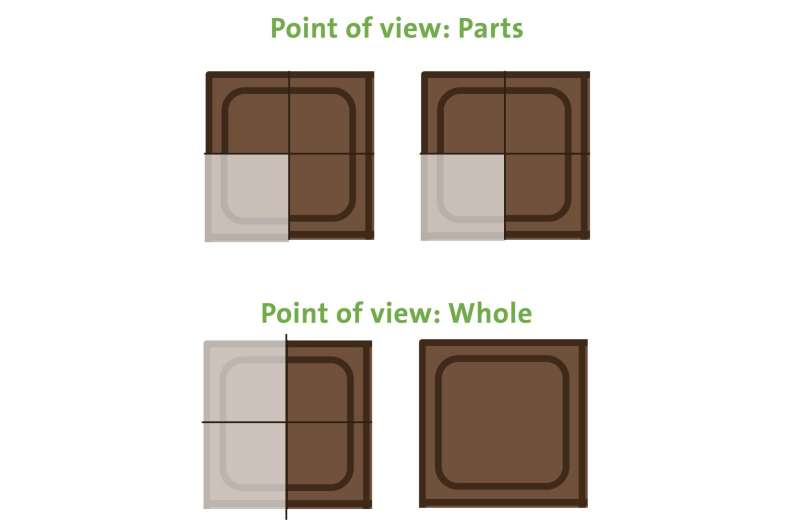Study: Cognitive flexibility enhances mathematical reasoning

At school or in everyday life, proportional reasoning is essential for many activities. This type of reasoning allows us to adapt the quantity of ingredients in a recipe or to calculate the distance traveled as a function of speed by relying on ratios and proportions. In school settings, certain intuitive conceptions of proportions can mislead students and hinder their learning.
A team from the University of Geneva (UNIGE) shows that multiple categorization in mathematical problems—the ability to adopt several points of view on the same problem—makes it possible to go past this obstacle. These results open up new perspectives for the learning of mathematics but also for other disciplines. The study was published in the Journal of Numerical Cognition.
Proportional reasoning is a cognitive process that involves ratios and proportions to solve a mathematical problem. This reasoning is regularly practiced and applied in school, but it is also very useful in our daily lives. It allows us to calculate the price of certain products when we shop, to adapt the quantity of ingredients in a recipe, to convert foreign currencies. It is at play when we understand that a speed of 30mph is equivalent to a distance of 15 miles traveled in 30 minutes. It is also involved in assessing our risk-taking: for example, when we make choices about our health by weighing the effectiveness of a treatment or vaccine against the risks of the disease.
This complex learning process usually starts being taught in schools in the second half of primary school. It may be hampered or limited by certain intuitive conceptions of proportions held by students. This is the case, for example, when a student thinks of a fraction as two whole numbers superposed on each other (1/2 is 1 over 2) and not as a ratio (1/2 is half of a quantity). In a recent study, the Instruction, Development, Education, Learning (IDEA) research group of the Faculty of Psychology and Educational Sciences of the UNIGE examined this phenomenon. The scientists managed to mitigate it by proposing specific mathematical exercises.
A key: Multiple perspectives
"The aim of this research was to show that multiple categorization—that is, adopting several points of view on the same problem—leads to cognitive flexibility, which helps students to reinterpret a mathematical statement in a more relevant way and improves their ability to solve it," explains Calliste Scheibling-Sève, post-doctoral researcher in the IDEA group of the UNIGE's Faculty of Psychology and Educational Sciences, and first author of the study. The scientific team tested this approach in schools of different socio-economic levels to ensure that all students could benefit from it.
Multiple categorization involves presenting students with mathematical problems that can be solved with different strategies depending on the perspective. For example, when we say '"I ate a quarter of two chocolates'", we can take a partitive view—I ate one quarter of each chocolate—or a whole view—I ate two quarters of a chocolate. This amounts to the same quantity but the mathematical modeling differs (¼ + ¼ = ¼ x 2 = 2/4 = ½ versus 2/4 x 1 = ½).
Similarly, in order to help students understand the concept of ratio and the reciprocity of multiplication and division, problems such as "Lisa has seven red cubes. Leo has 21 blue cubes. Who has more cubes? How many times more? Who has less cubes? How many times less?" can be presented and students can be asked to adopt both Lisa's and Leo's point of view. If Leo has three times more cubes as Lisa, it means that Lisa has three times less cubes than Leo. This mental gymnastics helps to establish the reciprocity of multiplication and division.
Significant improvements
Twenty-eight classes of CM1 and CM2 (9–10-year-olds and 10–11-year-olds) in the Île-de-France region participated in the study over the course of one school year. The classes constituting the experimental group received 12 mathematics lessons based on the principle of multiple categorization and involving problems with multiplicative structures (multiplication/division, fraction, proportionality). Their performance was compared to that of the control group, which received traditional mathematics lessons.
"At the end of the school year, the experimental group performed better than the control group on the post-test when solving proportional problems, and proposed more diversified solving strategies," reveals Emmanuel Sander, full professor in the IDEA group of the UNIGE's Faculty of Psychology and Educational Sciences, and the supervisor of the study.
"The analyses also show that the performance gap in favor of the experimental classes was observed in schools of all socio-economic backgrounds." Calliste Scheibling-Sève adds, "surprisingly, the 9–10-year-olds in the experimental classes achieved the same level of performance as the 10–11-year-olds in the traditional classes, i.e. pupils with an extra year of teaching."
These results offer new avenues for overcoming preconceived ideas that limit the learning of proportional reasoning. They also open up new perspectives for the development of cognitive flexibility at school in other disciplines. "This approach can be applied to other school subjects, such as science, grammar and citizenship education," explains Katarina Gvozdic, research and teaching fellow in the IDEA group at the UNIGE's Faculty of Psychology and Educational Sciences. The next step for the research team is to develop interventions based on these principles in other school subjects.
More information: Calliste Scheibling-Sève et al, Enhancing cognitive flexibility through a training based on multiple categorization: Developing proportional reasoning in primary school, Journal of Numerical Cognition (2022). DOI: 10.5964/jnc.7661
Provided by University of Geneva




















